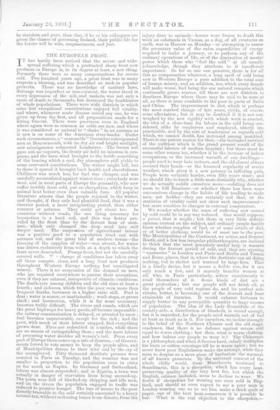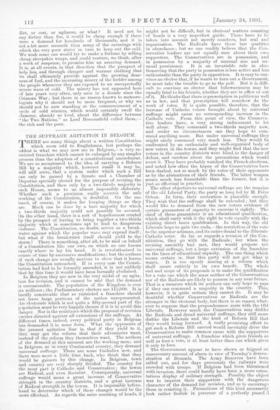THE EUROPEAN FROST.
IT has hardly been noticed that the severe and wide- spread suffering which a protracted sharp frost now produces in Europe is, in its degree at least, a new thing. Formerly there were so many compensations for severe cold. Two hundred years ago, a great frost was in many respects a blessing, and was described as such in popular proverbs. There was no knowledge of sanitary laws, drainage was imperfect or non-existent, the water stood in every depression of the soil, and malaria was not only a cause of death to thousands, but destroyed the healthiness of whole populations. There were wide districts in which none but exceptional constitutions enjoyed full vitality, and where, whenever acute disease seized any one, he was given up from the first, and all preparations made for a fitting funeral. There were provinces even in England where agues were as common as colds are now, and where it was considered as natural to " shake " in an autumn as it now is on some of the American river-banks. Under such circumstances, a" seasonable" December reinvigorated men as Bournemouth, with its dry air and bright sunlight, now reinvigorates Bxhausted Londoners. The frozen soil gave out no vapours, the frosty air held no miasma in sus- pense, and the keen wind brought to the feeble something of the bracing which a cool, dry atmosphere still yields to some enervated constitutions. The winter might kill, but to those it spared it brought back health and cheerfulness. Chilliness was much less, for fuel was cheaper, and was carefully accumulated against winter-time ; everybody wore wool, and in most parts of Europe the peasantry, who now suffer terribly from cold, put on sheepskins, which keep in animal heat better even than valuable furs. All popular literature attests that the people rejoiced in the winter, and thought, if they only had plentiful food, that it was a cheerier period, a more invigorating period, than either summer or autumn. They could get about too. In countries 'without roads, the one thing necessary for locomotion is a hard soil, and this was better pro- vided by the frost than by the fiercest heat of sum- mer, which only changed the deep mud into still deeper sand. The suspension of agricultural labour was a positive good to a population tired out with autumn toil, and the great trial of modern towns—the freezing of the supplies of water—was absent, for water was drawn exclusively from wells at a depth to which the frost never descended. Pumps froze, but not the carefully covered wells. change of conditions has taken away all these compen, .dons, and a long frost now produces throughout Western Europe nothing but unmitigated misery. There is no suspension of the demand on men, who are required everywhere to pursue their avocations, even if they are cabmen, irrespective of climatic conditions. The death-rate among children and the old rises at least a fourth ; and sickness, which tries the poor even more than frequent deaths, increases in a higher ratio still. Fuel is dear ; water is scarce, or unattainable ; work stops, or grows slack ; and locomotion, while it is far more necessary, becomes trebly difficult. The rivers and canals, which are the great highways for heavy goods, all become impassable ; the railway communication is delayed, or arrested by snow ; fuel becomes unprocurable, except for the rich ; and the poor, with much of their labour stopped, find everything grown dear. Fires are redoubled in number, while there are no means of extinguishing them ; and the mere labour of procuring water doubles all women's toil. From every part of Europe there comes up a tale of distress,—of Govern- ments forced to vote money to keep the people alive, and of Municipalities driven to their wits' end by the cry of the unemployed. Fifty thousand destitute persons were counted in Paris on Tuesday, and the number was not smaller in proportion to the population even in cities as far south as Naples. In Germany and Switzerland, labour was almost suspended ; and in Algeria, a, town was actually in danger of starvation from being snowed-up. The ports were full of blocked-up shipping and idle men, and on the rivers the population engaged in traffic was reduced to positive hunger. The loss of means to the poor directly traceable to the cold certainly amounted to a heavy income-tax, without reckoning losses from disease, from the injury done to animals—horses were frozen to death this week on cabstands in Vienna, as a dog, of all creatures on earth, was in Harrow on Monday—or attempting to assess the pecuniary value of the extra expenditure of energy required to make a journey, or to perform any of the ordinary operations of life, or of the diminution of mental power which those who "feel the cold" at all usually acknowledge, though they attribute to it insufficient importance. So far as one can perceive, there is for all this no compensation whatever, a long spell of cold being now in Western Europe a pure addition to the total sum of human misery, and an addition, too, which every decade will make worse, fuel being the one natural resource which continually grows scarcer, till there are now districts in Southern Europe where there may be said to be none at all, as there is none available to the poor in parts of India and China. The improvement in diet, which is perhaps the most marked change of late years, yields, of course, some alleviation ; but it may be doubted if it is not out- weighed by the new rigidity with which work is exacted, the idea of a close-time for labour in the cold being con- sidered, alike by employers and employed, utterly im- practicable, and by the sort of tenderness as regards cold which, we cannot doubt, has increased among mankind. There is one patent reason for that,—the increased survival of the unfittest which is the grand present result of the successful labours of modern hygeists ; but there must be some other reason too, whether it be the increase of indoor occupations, or the increased warmth of our dwellings— people used to wear hats indoors, and the old almost always covered their heads—or the lessened regularity of severe weather, which gives it a new potency in inflicting pain. People were certainly harder, even fifty years since ; and we should like to know a little more distinctly why, whether we do actually coddle ourselves more—coddling does not seem to kill Russians—or whether there has been some unconscious change in the habits of life tending to make men, not feebler—they are certainly not that, or the statistics of vitality could not show such improvement— but more sensitive to changes in external temperature.
We wonder whether the mass of suffering now caused by cold could be in any way reduced. One would suppose, a priori, that it might ; but there is very little dehnite opinion current on the subject, and ordinary people hardly know whether supplies of fuel, or of some article of diet, or of better clothing, would be of most use to the poor. The Municipalities of the Continent, we notice, and General Booth, and a few less irregular philanthropists, are inclined to think that the most genuinely useful help is warmth during the fiercest period of cold, and they are opening " warmeries " in London and Paris and Berlin and Vienna and Rome, places, that is, where the destitute can sit doing nothing, but in shelter and warmed by large fires. That is a kindly device, but it seems a feeble one, for it can only reach a few, and it scarcely benefits women at all, who, in Paris particularly, refuse unanimously to avail themselves of it. Some kinds of diet • are a great protection ; but our people will not drink oil, as the people of very cold regions do, and its perfect sub- stitute, butter, is becoming one of the dearest and least attainable of luxuries. It would exhaust fortunes to supply butter in any perceptible quantity to large masses of population. . The idea of the Lady Bountifuls of the country-side, a distribution of blankets, is sound enough, but it is imperfect, for the people need warmth out of bed at least as much as in it. For ourselves, we incline strongly to the belief of the Northern Chinese and the old stage- coachmen, that there is no defence against severe cold equal to warm clothing ; but then, what is warm clothing, and how induce our people to wear it ? The Chinaman is a philosopher, and when it freezes hard, calmly multiplies his linen or cotton coverings till he is warm again ; but we never knew poor Englishmen make the attempt, while they seem to despise as a mere piece of barbarism the warmest of all known garments. By the universal consent of the whole chilly world, from Marichooria westward to Scandinavia, this is a sheepskin, which has every heat- preserving quality of the very best fur, but which the English, cabmen included, seem to decline to wear. We doubt if sheepskins for wearing are even sold in Eng- land, and should as soon expect to see a poor man in London wearing one as to see him make a thick quilt of paper, one of . the best heat-conservers it is possible to use. What is the real objection to the sheepskin,— dirt, or cost, or ugliness, or what ? It need not be any dirtier than fur, it would be cheap enough if there were a demand for hundreds of thousands, and it is not a bit more uncouth than many of the coverings with which the very poor strive in vain to keep out the cold. We wish some one would try to make a fortune by selling cheap sheepskin wraps, and could venture, we think, after a week of suspense, to promise him an amazing demand. It is, at all events, in that direction that the prospect of help lies, and through cheaper and warmer clothing that we shall ultimately provide against the growing dear- ness of fuel, and the increasing misery of the feebler among the people whenever they are exposed to an unexpectedly severe wave of cold. The misery has not appeared. here of late years very often, only once in a decade since the Crimean War ; but there is no reason known to meteoro- logists why it should not be more frequent, or why we should not be now standing at the commencement of a cycle of cold winters, which would certainly swell the clamour, already so loud, about the difference between 4`the Two Nations," as Lord Beaconsfield called them,— the rich and the poor.







































 Previous page
Previous page